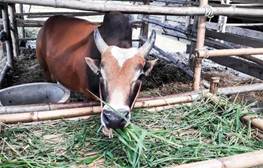- Bamboo sequestrates highest carbon and best solution for global warming.
- Best energy crop and suitable for short harvesting rotation.
- Environmentally highly sustainable, generates rural employments.
- Bamboo is as strong as that ofsteel in terms of tensile strength.
- Bamboo is 27% stronger than red oak.
- Bamboo is resistant to termitesmoisture and coloration.
- Everything in wood can be produced from bamboo
- Bamboo grows faster than any other plants on earth.
- Full diameter at birth, full height in 1-month time.
- Full strength in 3-4 years.
- Poles(culm) grows each year and harvested annually.
- Productivity: each year 20-50 tons dry bamboo per acre.
- 3-5 years establishment times.
- Lasts 35-100 and more years, even indefinitely.
- Grows underground and binds the soil.
- Increases the water table and retains rain water.
Bamboo is used since ancient times in many areas such as Construction, furniture, medicine, food, musical instruments etc. Recent innovations let to utilization of bamboo in large quantitiesfor the production of electricity, Bio-ethanol, Bio-CNG, Bio-Oil, Activated charcoal, Bio-Plastic or Co-polymer, Textile, reinforcement in concrete, replacement of coal in manufacturing cement, steel, etc.
Health Benefit of Bamboo
Bamboo being the fastest growing plant, generates over 60tons of oxygen every year from one acre of bamboo garden which is enough for breathing over 200 human being. Apart from reduction of CO2 by its carbon sequestration ability, bamboo reduces PM2.5 and PM10 through its leaf surface, which are the main health assorts in cities.
The health benefits of bamboo shoots include healthy weight loss, balanced cholesterol levels, and a boosted immune system. They also have cancer-fighting and anti-inflammatory properties. They are heart-friendly and contain protein, aenough supply of vitamins and minerals.
As Animal Feed
Soft stems and leaves are the major food source of the giant panda of China, the red panda of Nepal, and the bamboo lemurs of Madagascar. Mountain gorillas of Central Africa also feed on bamboo and have been documented consuming bamboo sap which was fermented and alcoholic, chimpanzees and elephants of the region feeds on the stalks. Bamboo leaves are provided as feed for cattle, sheep, goat, donkey and for chicken. Bamboo leaves can meet the Calcium demand for these animals since bamboo absorbs and accumulates Calcium from the soil higher than many other plants.

